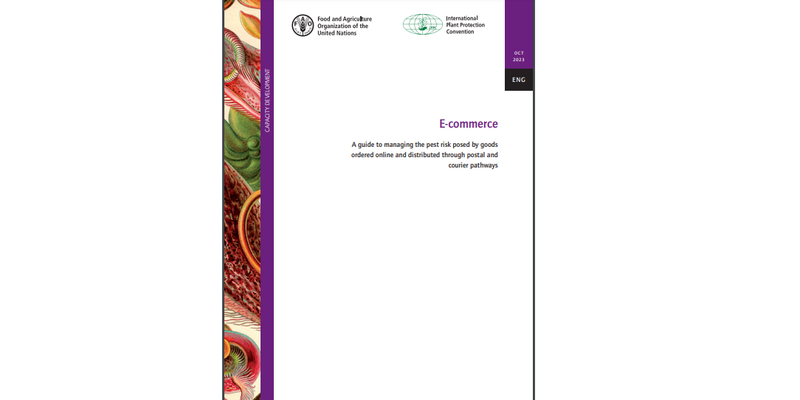New IPPC guide to protect plant health and reduce pest risk associated with e-commerce
Posted on Thu, 30 Nov 2023, 12:10

Rome, 23 November 2023. The International Plant Protection Convention (IPPC) Secretariat has published a new IPPC guide to help contracting parties predict and manage the threats and challenges posed by online trading of plants and plant products.
The publication, titled E-commerce: A guide to managing the pest risk posed by goods ordered online and distributed through postal and courier pathwaysaddresses the challenges faced by national plant protection organizations (NPPOs) in regulating the movement of plants, plant products and regulated articles such as agricultural products, ordered online and transported through international postal and courier channels. The guide provides essential information and strategies for managing the likely pest risk. It was developed by the IPPC Secretariat, in collaboration with a team of global phytosanitary experts.
Publication of this guide is timely, as the world is witnessing a rise in global e-commerce. E-commerce, associated with increased internet use and technological advancements, has transformed global trade and the movement of goods, including plants, plant products and regulated commodities like seeds. E-commerce has increased access to wider markets, and expanded economic growth possibilities, especially for developing countries.
Whilst e-commerce brings many business opportunities, it also increases the risk of introduction and spread of plant pests through parcels moving in postal and courier pathways, especially if they do not meet the phytosanitary requirements of the importing country.
Why an IPPC e-commerce guide?
Under the IPPC 2020-2030 Strategic Framework, the IPPC recognizes the increase in more diversified trade and has included e-commerce as a development agenda item. The aim of doing so is to mitigate the plant health risks associated with e-commerce. This IPPC guide is designed to provide NPPOs with the knowledge and tools to mitigate the risks from movement of parcels that may contain plants or plant products, while supporting international e-commerce transactions. A key focus of the guide is to encourage NPPOs to engage with actors in the e-commerce supply chain, including online user groups, to raise awareness of phytosanitary import requirements and encourage collaboration. It emphasizes the importance of communication and education in promoting compliance and helping online shoppers “think before they click”. Many online shoppers are often unaware of import restrictions on some plants and plant products.
Recognizing the importance of education and awareness-raising in promoting compliance and mitigating plant pest risks, NPPOs can use this IPPC guide to design procedures that will ensure buyers in importing countries, sellers in exporting countries and e-commerce platforms, have easy access to information on phytosanitary requirements of plants and products in international trade.
The guide will also help NPPOs identify and manage pest risks, establish effective communication and cooperation with e-commerce stakeholders, and strengthen their regulatory frameworks.

“The IPPC Strategic Framework 2020-2030, prioritizes management of the pest risk associated with e-commerce, considering the growing international trade and pathways for pest spread. This IPPC guide on pest prevention via e-commerce and courier pathways is a milestone for the plant health community, in our global effort to prevent the introduction and spread of pests,” said Osama El-Lissy, IPPC Secretary.
“I am confident that by implementing the recommendations in this guide, countries can improve plant health, comply with international phytosanitary standards, foster food security, protect the environment, and facilitate safe international trade,” he added.
Related information:
- Website: e-Commerce and plant health
- News feature article: Think before you click: Mitigating the risks of e-commerce to plant health

